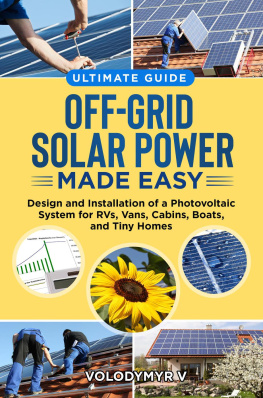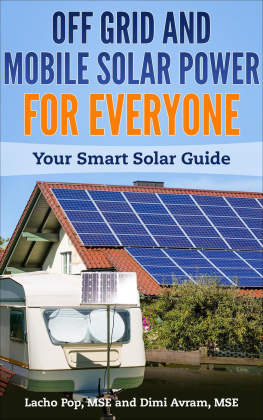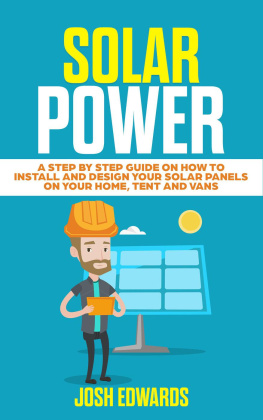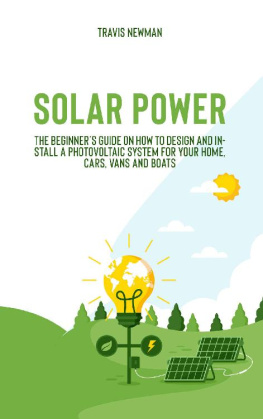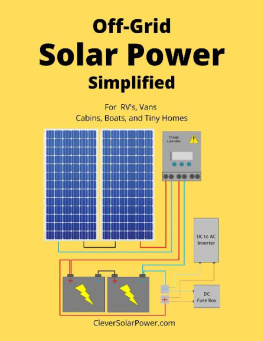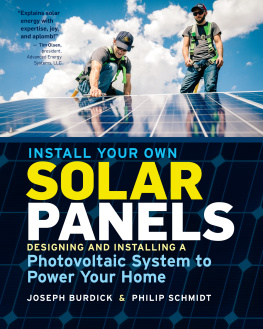Copyright
Copyright 2019 by Volodymyr Vasyliv and Fred Connor
All rights reserved.
This book or any portion thereof may not be reproduced or used in any manner whatsoever without the express written permission of the publisher except for the use of brief quotations in a book review or scholarly journal. First Printing: 2021.
Although the author and publisher have made every effort to ensure that the information in this book was correct at press time, the author and publisher do not assume and hereby disclaim any liability to any party for any loss, damage, or disruption caused by errors or omissions, whether such errors or omissions result from negligence, accident, or any other cause. Please use common sense and practical safety considerations while working with any electrical system.
Any product names, logos, brands, and other trademarks or images featured or referred to within this book are the property of their respective trademark holders.
Table of Contents
If you are reading this, it is because you are serious about going off the grid. I am well aware that there are plenty of sources of information out there for you to choose from. So, it is an honor to have you go through these pages.
Granted, not all sources of information are credible and reliable. So, great care has been taken in making this book as practical and accurate as possible. I continuously work on the improvement of this book to make it the best quality, among other solar power books.
The solar power system can not only help you get off the grid but also become completely self-reliant.
This is something the key here.
You see, most of the folks I talk to are concerned about having power, especially in those times when there are disruptions in the regular service. It is not so much a question of saving money, but it is a question of being self-reliant.
For who is this book?
This book is designed for beginners, for those who know a little to nothing about solar power and photovoltaics. If you are a professional electrician or photovoltaic practitioner this book might not be very useful for you.
Think about the many ways in which your power supply could be disrupted. Anything is possible. Even something as simple as a faulty line can wreak havoc on a community.
Furthermore, the cost of the average electric bill has gone up over the years. According to the US Bureau of Labor Statistics, the price of electricity has gone by 468% from 1930 to 2019.
468%!
With the prices of oil and natural gas, the price of electricity and heating is not going down any time soon. This is even worse when you consider that wages dont increase nearly as much as prices do. From 1973 to 2013, the hourly compensation of workers, on average, rose 9.2%.
Lets consider this situation:
A typical 5-kilowatt system can cost approximately $18,000 to $25,000. If you are not familiar with these costs, you might be shaking your head right now. But fear not, most states have a rebate plan in which you can deduct taxes from the cost of your solar panel system.
Yes, thats right.
So, I would encourage you to check out what your state has to offer as each state has different incentives and rebates. In general terms, you can bring the cost to your system down to about $14,000 when everything is all said and done.
Now, assuming that the average electric bill runs to about $1,200 a year (of course, this may be a lot more depending on the part of the country or the world), you can essentially save this entire amount of money per year if you draw your entire power sources from your solar-powered system.
In total, you can save roughly $30,000 over the lifespan of your system. Thats not chump change if you ask me.
This last fact is particularly eye-opening when you consider that electric bills rise, on average, 5% per year. Moreover, this is a lot worse when you factor in that your electric bill is at the mercy of international oil prices and the earnings of the stockholders of the utility companies. Even if your local utility company is public, they still have to raise rates in order to pay their own bills.
Another very important reason for you to go solar is that it will increase the value of your home.
Think about that for a moment.
If you are shopping for a home, finding a home with a fully-functioning solar power system is a real plus. Purchasing a home that is energy independent is such an appealing factor that homebuyers are generally willing to bid against each other. This is especially true in markets where electricity is expensive. This is magnified when you consider how much electric bills can run up during the wintertime. When you factor in the cost of heating during the winter, having a solar power system will certainly alleviate much of the pressure on your utility bills.
In general, having a fully-functioning solar power system can add 3.6% to the value of a home, according to the National Bureau for Economic Research. Bear in mind that this is a national average. This is what I mean when I say that the price of your home can rise dramatically depending on the area in which you live.
Everything sounds really good at this point, doesnt it?
Yes, it is clear that we are extolling the benefits of having your own solar power system; there are a couple of caveats to keep in mind.
First, it is certainly worth taking your time to plan out how you will set up your system. While we will cover this in the following chapters, I would encourage you to walk around your home and visualize where you may choose to install the various components of the system: the panels, the battery, controllers, and so on.
The other caveat that I would like to point out is leasing.
There are some companies out there that offer the leasing of such systems. In short, leasing means that you pay the leasing company for the use of the system and not for the energy generated by the system. I am against this type of system for one very important reason: you will never be self-reliant. This is due to the fact that the system is not your property but the property of the leasing company.
Sure, it might be a lot more convenient to have the system installed by someone else, but when it comes time to rely on the system, the leasing company can pull your contract at a time. If you have ever leased a car, then you know what I mean.
Thus, I would not advise you to lease a system. It is always best to go through the wringer and set up your own system, which you know will always be there for you, no matter what.
That is why this book is intended for the do-it-yourselfer who is concerned about security, familys comfort, and safety. By going down this road, even if it is a bit tough, you will be able to get some peace of mind in knowing that your supply of power will always be there.
Unless the sun suddenly burns out next week, you can be confident that you will have a consistent supply of power. In the event of an emergency, this can be a real lifesaver. It doesnt matter if you use your system as a complement to your current electrical installation or to go completely off the grid. However, you choose to set up your system, you can be sure that you will never run out of power.
Next page
